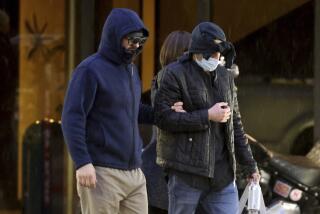Alfred Stern; Accused of Spying for Soviets
- Share via
PRAGUE, Czechoslovakia — Alfred K. Stern, a multimillionaire businessman who was charged in 1957 with spying for the Soviet Union, died of cancer Monday in exile here, the Czechoslovak News Agency Ceteka reported. He was 88.
Stern and his wife, Martha Dodd Stern, daughter of the last U.S. ambassador to Berlin before World War II, left the United States in 1957 after being accused of subversive activities.
They had been accused before the House Committee on Un-American Activities of spying.
U.S. Indictment
Their accuser was Boris Morros, a film producer and U.S. undercover agent, and the subsequent federal grand jury indictment charged them with conspiring to act as Soviet agents, receiving American military, commercial and industrial information and transmitting it to the Soviet Union.
They were alleged to have used their house at Ridgefield, Conn., for meetings with Soviet agents. The charges, consistently denied by the Sterns, were dropped 22 years later, in 1979, when the Department of Justice said witnesses considered essential to the case had died.
Stern was born in Fargo, N.D, into a wealthy family.
He served as chairman of the Illinois State Housing Commission and later as vice president of the National Assn. of Housing Officials and director and chairman of the Citizens Housing and Planning Council in New York.
After the indictment, the Sterns went to Mexico, visited Prague in 1957 and after staying in the Soviet Union for about a year settled in Prague in 1958.
Stern lived for a time in Cuba, acting as a personal adviser to Fidel Castro. He and his wife were also friendly with other Communist leaders, including Yugoslavia’s Marshal Tito and China’s Chairman Mao-Tse-tung.
In Prague, Stern worked as a consultant to the ministry of construction, using his expertise in housing and construction technology.
He is survived by his wife and a son.
More to Read
Sign up for Essential California
The most important California stories and recommendations in your inbox every morning.
You may occasionally receive promotional content from the Los Angeles Times.













